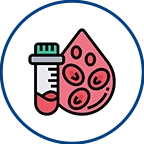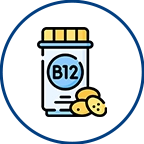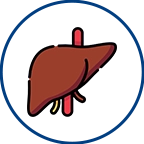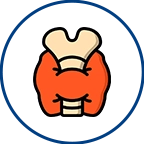Lactate - CSF Testing in Pediatric Care: Special Considerations
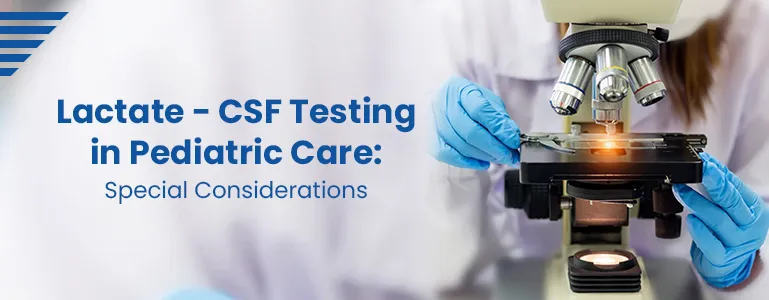
When it comes to healthcare, children are not just small adults. Their physiology, anatomy, and healthcare needs differ significantly from those of adults. This distinction is especially important when it comes to diagnostic testing, such as the Lactate - CSF test, which measures lactate levels in cerebrospinal fluid (CSF). In this blog, we'll explore the special considerations and nuances of Lactate - CSF testing in pediatric care.
Understanding the Lactate - CSF Test
The Lactate - CSF test involves analyzing the level of lactate in cerebrospinal fluid, the clear, colorless fluid that surrounds the brain and spinal cord. This test is primarily used to assess neurological conditions and infections that affect the central nervous system.
Home Sample Collection
Why Pediatric Lactate - CSF Testing Differs
Pediatric patients present unique challenges and considerations for medical professionals when it comes to diagnostic testing. Here's why Lactate - CSF testing in pediatric care differs from testing in adults:
Age-Dependent Reference Ranges: Lactate levels in CSF can vary with age. What may be considered normal for an adult may not be the same for a child. Healthcare providers must use age-appropriate reference ranges to interpret test results accurately.
Limited CSF Volume: Collecting CSF from a child can be more challenging than from an adult due to the smaller volume of CSF available. Specialized pediatric needles and collection techniques may be needed.
Cooperation and Comfort: Pediatric patients may not understand the importance of the procedure or may be fearful. Healthcare providers must ensure that children are as comfortable as possible during the test, often requiring the involvement of child life specialists or play therapists.
Parental Involvement: Parents or guardians play a crucial role in supporting pediatric patients through the testing process. Their understanding and cooperation are essential.
Condition-Specific Considerations: Some neurological conditions affecting children may have unique characteristics that necessitate specific testing protocols or interpretations.
Common Pediatric Applications of Lactate - CSF Testing
Pediatric Lactate - CSF testing is employed in various clinical scenarios, including:
Meningitis: To diagnose or rule out bacterial or viral infections of the central nervous system.
Encephalitis: To assess brain inflammation and identify causative agents.
Seizure Disorders: In some cases, elevated lactate levels may be associated with certain seizure disorders.
Neurological Diseases: In the evaluation of neurological conditions such as mitochondrial disorders, where lactate accumulation may be a key diagnostic marker.
Conclusion
Pediatric Lactate - CSF testing requires a tailored approach that considers the unique characteristics and needs of children. Accurate interpretation of results, along with effective communication and a child-friendly environment, ensures that pediatric patients receive the best possible care. In the hands of skilled healthcare providers experienced in pediatric diagnostics, Lactate - CSF testing can be a valuable tool in diagnosing and managing neurological conditions in children, ultimately contributing to their well-being and health.
Frequently Asked Questions
What is Lactate - CSF testing, and why is it important for pediatric patients?
Lactate - CSF testing measures lactate levels in cerebrospinal fluid and is crucial for diagnosing and managing neurological conditions in children.
How do pediatric reference ranges for Lactate - CSF testing differ from those for adults?
Pediatric reference ranges consider age-related variations in lactate levels, ensuring accurate interpretation of results for children.
Is Lactate - CSF testing painful or uncomfortable for pediatric patients?
Lactate - CSF testing involves a lumbar puncture (spinal tap), which can be uncomfortable. Healthcare providers take measures to minimize discomfort and anxiety, often involving child life specialists or play therapists.
What conditions in pediatric patients may prompt Lactate - CSF testing?
Lactate - CSF testing is commonly used to diagnose or rule out conditions such as meningitis, encephalitis, seizure disorders, and mitochondrial disorders in children.
How can parents or guardians support pediatric patients during Lactate - CSF testing?
Parents or guardians play a vital role in comforting and reassuring their child during the procedure. Understanding the importance of the test and being present can help ease the child's anxiety.
Are there any specific preparations required before a pediatric Lactate - CSF test?
Pediatric Lactate - CSF testing may require fasting or specific dietary restrictions depending on the clinical indication. Parents and caregivers should follow the instructions provided by the healthcare team.
Are there any potential risks or complications associated with Lactate - CSF testing in children?
While Lactate - CSF testing is generally safe, there are potential risks, including infection, bleeding, or headache after the procedure. Healthcare providers take precautions to minimize these risks and monitor patients closely.
Book Your Slot
Our Locations Near You in Hyderabad
3KM from Banjara Hills
1.9KM from Yusufguda
3KM from Madhura Nagar
5KM from Shaikpet
Profiles
- Cardiac Risk Profile
- Pituitary marker Profile
- Rheumatoid Arthritis Profile
- Dengue Fever Panel
- Lung Cancer Panel 1 Complete Molecular
- Gastroenteritis Screening Panel
- Thyroid Profile (T3,T4,TSH), Serum
- Pancreatic Marker Profile
- STD profile
- Androgen Profile
- Lipid Profile, Serum
- Pancreatic(acute)Profile
- PCOD Profile
Radiology
Pathology Tests
- Glucose Fasting (FBS),Sodium Fluoride Plasma
- Creatinine, Serum
- Glycosylated Hemoglobin (HbA1C)
- Vitamin B12 (Cyanocobalamin), Serum
- Thyroid Stimulating Hormone (TSH) Ultrasensitive, Serum
- Complete Urine Examination (CUE), Urine
- Liver Function Test (LFT),Serum
- Dengue (IgG & IgM), Serum
- Dengue Antigen (Ns1) Rapid, Serum
- C-Reactive Protein (CRP), Serum
- Widal (Slide Method), Serum
- Total IgE, Serum

